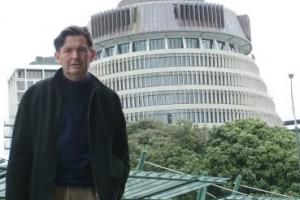
AUCKLAND (Bruce Jesson Foundation / Pacific Media Watch): Film-maker Alister Barry has been awarded the Senior Journalism Award by the Bruce Jesson Foundation.
The $4000 prize was awarded for his feature-length film documentary Hot Air, which told the history of the politics of climate change in New Zealand from 1988 to 2008.
Alister’s film would contribute to public debate on the politics of climate change, documenting “a political struggle over the burning of oil and coal which is causing the extinction of thousands of species”, the Bruce Jesson Foundation wrote on its website.
Alister Barry has a distinguished record of completing work that has generated public awareness and debate.
His films as writer-director include Someone Else’s Country (1996), In a Land of Plenty (2002) and The Hollow Men (2008), the latter adapted from the book of the same name by last year’s Bruce Jesson lecturer Nicky Hager.
Two emerging journalists
The Jesson Foundation’s Emerging Journalist Award of $1000 was shared between Ruth Keber and Deena Coster.
Keber, a journalism student at Massey University, received the award for The New Māori Muslims, published in North & South in March this year.
Coster, a journalism student at the Western Institute of Technology Taranaki (WITT), wrote a portfolio of articles in the Taranaki Daily News, published in the period June-September this year.
The New Māori Muslims told the story of a young woman’s personal testimony of a flight from abuse to the embrace of Islam, then broadening into an exploration of linkages between Māori and Muslim culture and consideration of Islam and religious diversity in New Zealand.
Deena Coster’s portfolio of articles showcased a student journalist following in the tradition of the best kind of local newspaper journalism, displaying community commitment, social concern over issues like pay and housing, and the initiative to dig around.
This year’s Bruce Jesson lecture was given by Sir Edmund (Ted) Thomas who spoke at The University of Auckland on the catastrophic social consequences of the neo-liberal revolution, debunked the mythology surrounding it, and proposed a strategy for arresting its excesses and turning back the tide.
This work is licensed under a Creative Commons Attribution-NonCommercial 3.0 New Zealand Licence.




